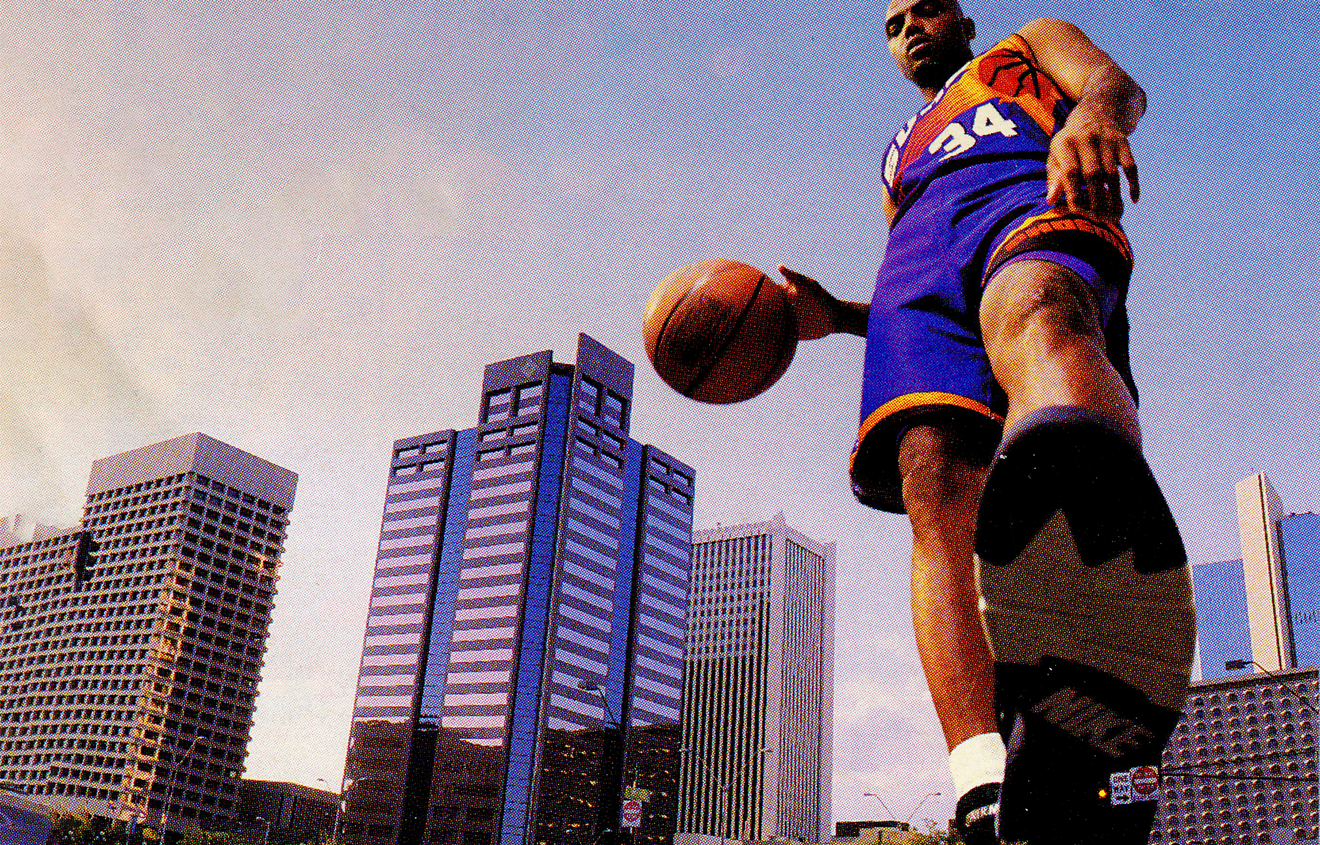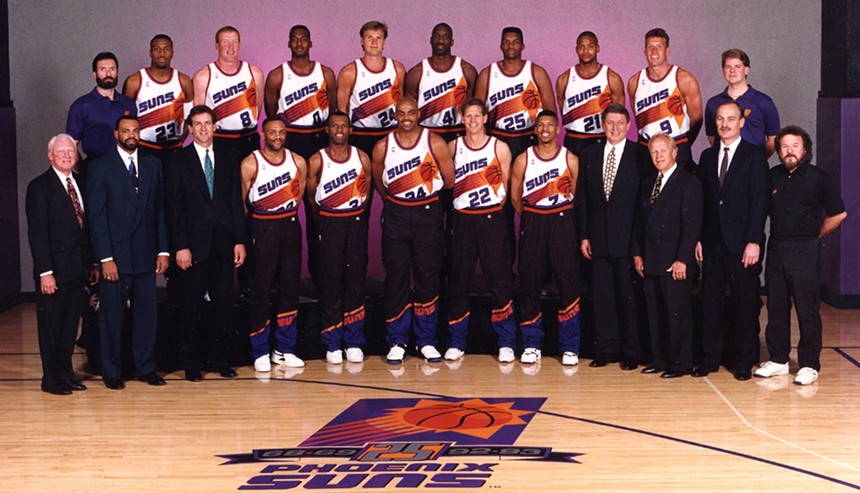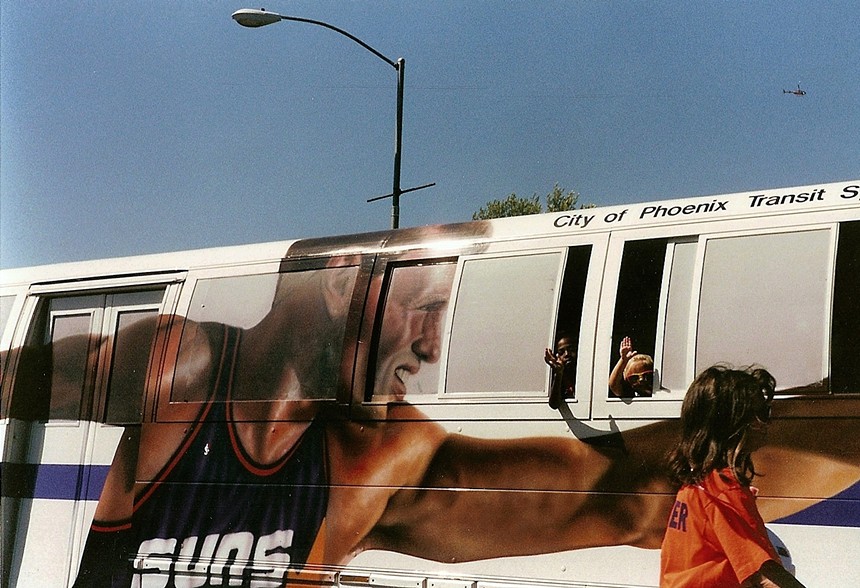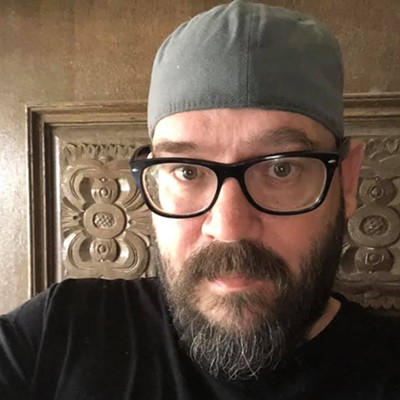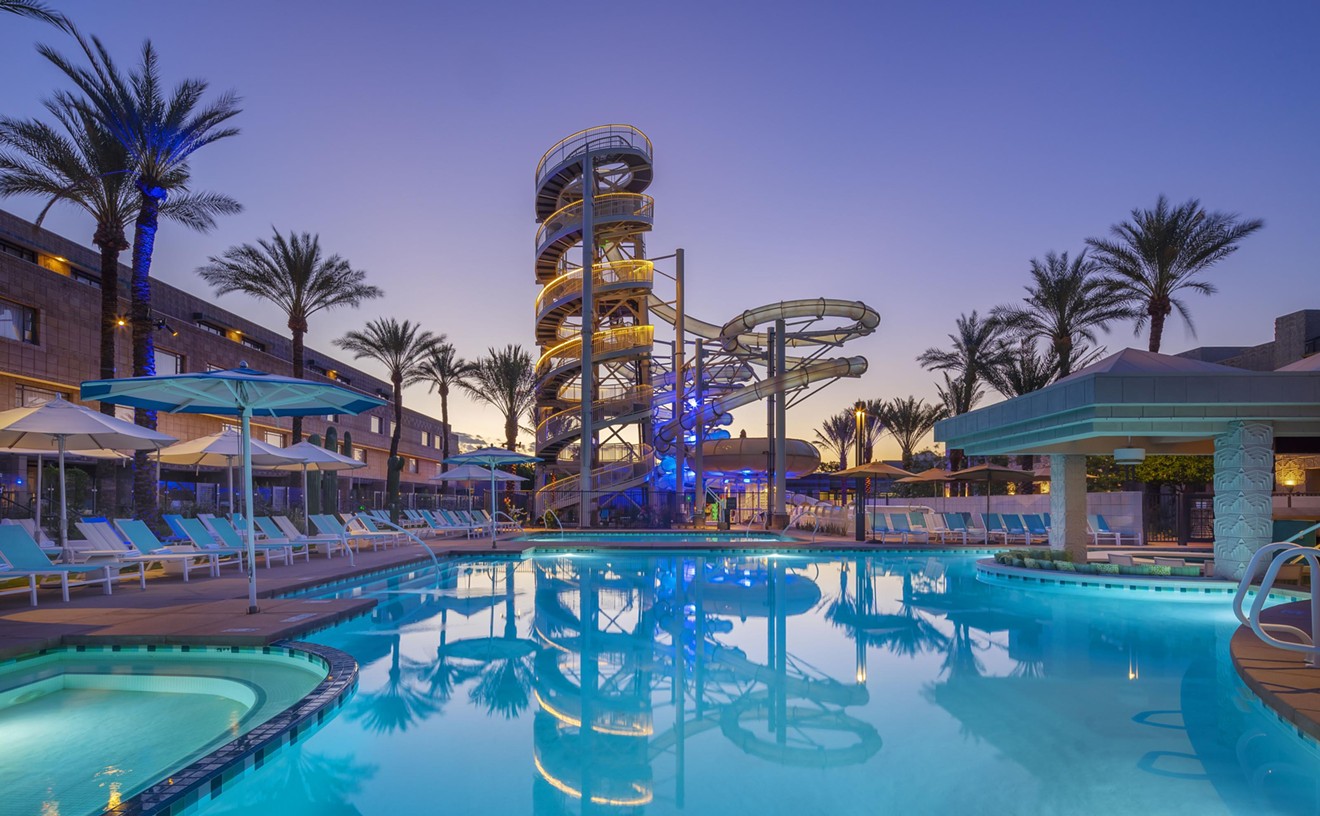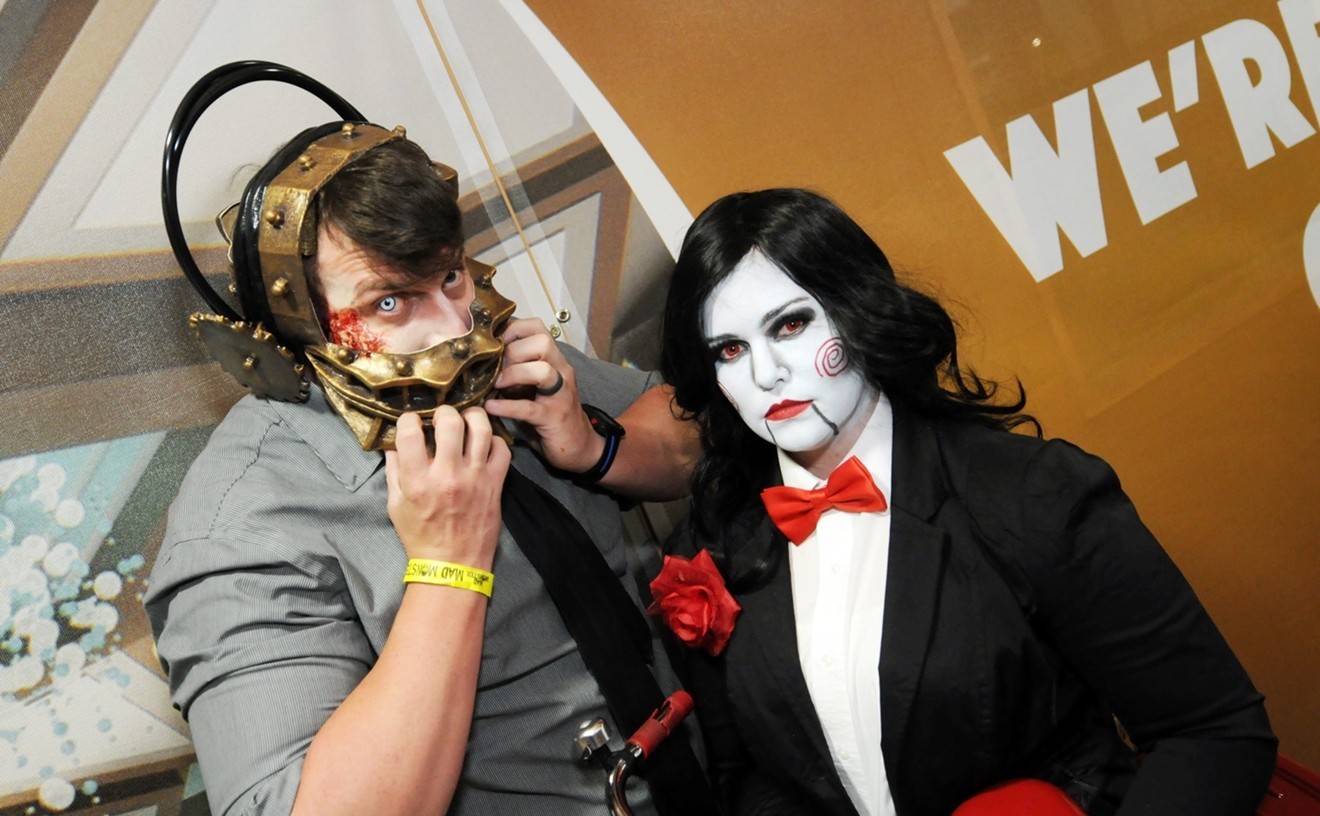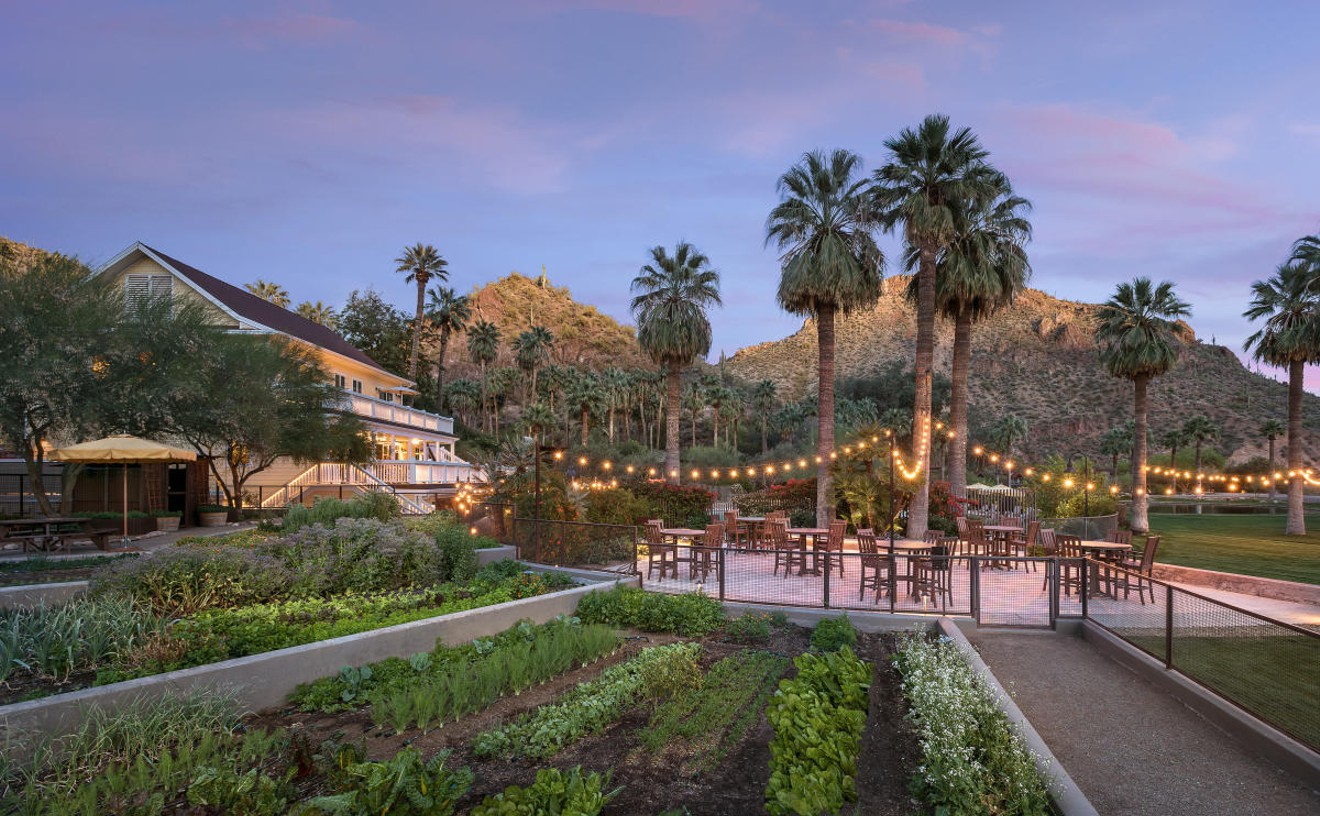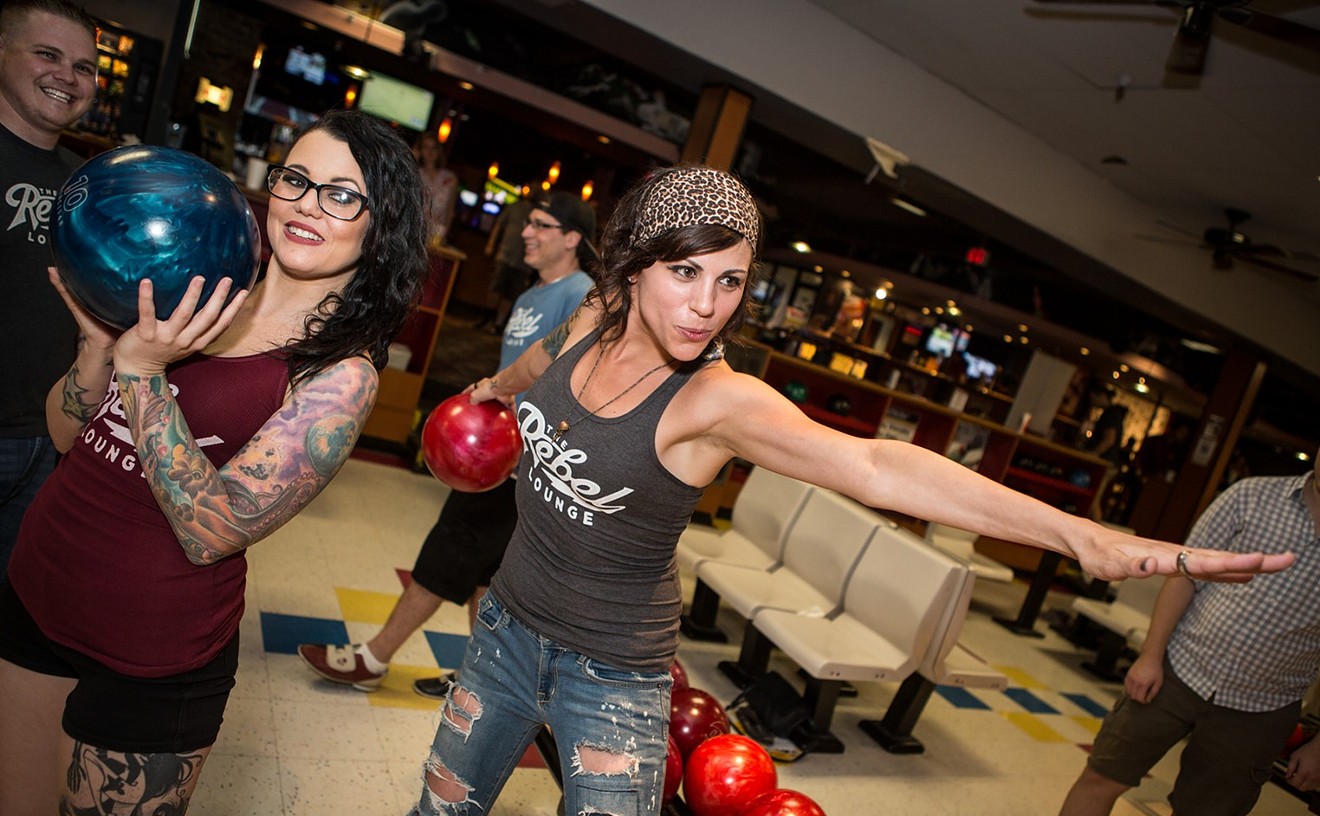Led by future Hall of Famer Charles Barkley, who had been traded to the team the previous year, the Suns had the NBA’s best record, the top seed in the playoffs, and momentum on their side. Their ultimate goal was Phoenix’s first NBA title, which — according to Barkley — was the team’s destiny ordained by God himself.
Meanwhile, Suns fever gripped the Valley. Players were treated like royalty. Jerseys and other team gear were sold on street corners. Purple and orange were everywhere. For many fans, Barkley and company are considered to be the best Suns team in the franchise’s 55-year history.
Despite some bumps, the ‘93 Suns made it to the NBA Finals and faced the league’s ultimate end bosses of the era: Michael Jordan and the Chicago Bulls, who’d won the title the previous two years and sought a three-peat. MJ and the Bulls lived up to their fearsome reputation, winning the first two games handily. Undaunted, the Suns battled back and took the series to six games before being defeated.
In honor of Phoenix’s legendary 1993 playoff run, which happened 30 years ago this month, we’re revisiting one of the greatest sports moments in Valley history through the memories of the people who experienced it, from the players on the court to the fans and announcers watching the action and drama unfold.
Y’all ready for this? Cue up “Roundball Rock” and we'll rewind the clock.
Charles in charge
By the time Charles Barkley got to Phoenix in 1992, the Suns were undergoing major changes. Assistant Coach Paul Westphal became head coach. The team moved to the newly opened America West Arena (now Footprint Center). They even got new uniforms. Widely seen as a good team but not serious contenders, what the Suns really needed was something to up their game. Enter Charles Barkley.Will Novak, Valley native and lifelong Suns fan: As the story goes, Cotton Fitzsimmons, who was [moving] to the Suns’ front office at the time, literally said, "We need a player like Charles Barkley." So they went out and traded for him.
Lee Shappell, former Arizona Republic sportswriter: Why did the Suns get Barkley? Because they couldn't get to the top. They were coming off of four straight years with Cotton Fitzsimmons as coach, and Kevin Johnson, Jeff Hornacek, Tom Chambers, Dan Majerle as the core guys. It was a very good team that won no fewer than 53 games for four straight years, but they couldn't get to the [NBA Finals]. The Suns were known as a vanilla team, lacking toughness and playing a style that was fun to watch, but [they] couldn't execute a half-court play in a playoff game to save their lives.
Novak: I was a kid and Jeff Hornacek was my favorite player, so when they traded him [with Tim Perry and Andrew Lang], I was heartbroken. I cried and my dad was like, "Don't worry about it."
Negele Knight, former Suns point guard: My best friend was Tim Perry. We walked into practice one day and I'm like, "What's wrong?" He just got this look and said, "I just got traded for Charles." I was like, “We about to win a championship."
Shappell: The new arena was already sold out for the season before they ever traded for Charles. They didn't get Charles to sell tickets; they got Charles to bring home a championship banner.
Novak: He’d just been on the Dream Team at the [1992 Summer] Olympics, so it was like, “This guy who just beat the world is going to play for us and get a title.”
Tom Chambers, former Suns power forward: We had a bunch of good guys that played hard, played well. The style of the team changed a whole bunch, but certainly, we were better once Chuck came to town. He added so much to the team.
Shappell: They became more of a half-court team. They still had guys who could run and weren't afraid to pull a fast break if there was an opportunity created off defense. And they could also bump, grind and throw it down in the low post. And Charles was a terrific post-up player, and if he caught the ball on the low block, he was either going to score, or get fouled or both. So that was new for the Suns. And so suddenly opponents had to double-cover that, and the Suns could get the ball to their three-point shooters: Dan Majerle and Danny Ainge, who they'd acquired and was a huge part of that team.
Tom Chambers: Charles was obviously the best power forward in the NBA, so my role [changed]. I had to play a little small forward, power forward, even some center, and find minutes. But I still played a vital role for the team. I wasn’t the star, but that was okay. The one thing I hadn't done in my career was winning a championship.
Al McCoy, longtime Suns play-by-play announcer: [Barkley] was the key. There were great players on that team and they were all contributors, but Charles certainly was the leader. I’d never followed a player that simply would not let his team lose. It was Charles' greatest year.
Skyler Chambers, son of Tom Chambers: [Barkley] just commanded that team … He had the mentality that he was the best, he knew he was the best, and he was going to do anything to make [a championship] happen.
Charles Barkley, former Suns power forward (on the "All the Smoke" podcast in February): We get off to a slow start. So I'm with [then-Suns owner Jerry Colangelo] and I says, “Okay, this is the deal: We're going to the finals. I think I'm the best basketball player in the world. We are going to the finals [and] we're going to play the Bulls for the championship."
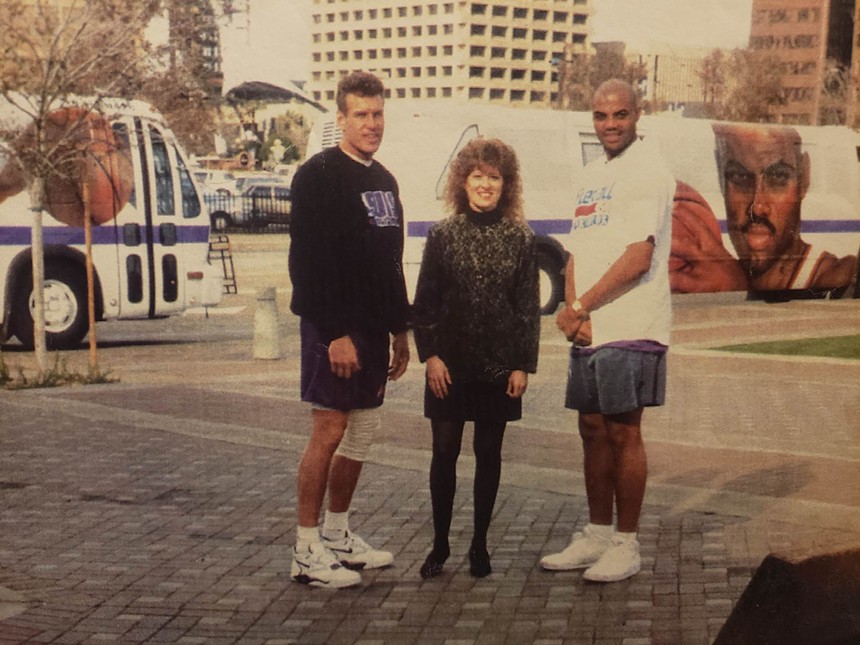
Local artist Maggie Keane (center) with Dan Majerle (left) and Charles Barkley (right) in front of city of Phoenix buses she painted with their images.
Maggie Keane
Suns fever spreads
As Phoenix started winning, Suns fever began sweeping the Valley. It grew throughout the season and into the playoffs and NBA Finals.Richard Dumas, former Suns small forward: That season was wild. It's like every [home] game was a sellout. It was like a big party.
Novak: Back then, some bigger regular season games would be on pay-per-view, which seems insane now. People would hold parties to watch pay-per-view games. They’d name their dogs Barkley or start naming their kids after players.
Super Snake, former on-air talent, Power 92.3 (now Power 98.3): Power 92 made Suns signs. Every bus driver in Phoenix would stop at the station to get some to give [riders]. I kept stacks of ‘em in the car.
Novak: Biltmore Fashion Park changed its name to Purple Passion Park. There was this big mural painted on Seventh Street across from the Phoenix Country Club that's still there today that says “Go Phoenix Suns.”
Derek Montilla, Valley native and longtime Suns fan: Everybody was going all in on the Suns. They became absolute rock stars. It felt like Barkley brought so much of that attention onto them, but obviously, a big part of it was just the fact the team was so good.
Maggie Keane, local artist: I was a billboard painter and this company hired me to paint [city] buses with portraits of players. I did Barkley, part of Kevin Johnson, Tom Chambers and Dan Majerle. When I went to parties, people knew who I was because it was suddenly a huge thing with the Suns being so big and the buses out on the streets [daily].
Skyler Chambers: Everybody was a Suns fan at the time. The entire state rallied around [the team]. It was contagious.
Montilla: Honestly, one of my favorite summers of my entire life was the summer the Suns made their championship run. It's still fresh in my memory of my large family [sitting] in the living room of the house I grew up in watching every game. It was one of the only times I remember my family being so united. It was an amazing time to be a Suns fan.
Playoff problems
Phoenix finished the 1992-93 season with the NBA’s best record at 62-20, earning home-court advantage throughout the playoffs. They almost blew it in the opening round against the eighth-seeded Los Angeles Lakers, though, losing the first two games of the best-of-five series at home. Barkley started to panic. Westphal kept his cool, famously declaring in post-game interviews Phoenix would bounce back and take the series. Tom Chambers: Unfortunately, we didn't rise to the occasion to take care of business in the beginning on the home court like we should have.
Shappell: KJ got injured near the end of the season. That was a big piece of it. And the Lakers, even though they were nowhere near the “Showtime Era” from years prior, still matched up really well against the Suns and won two in Phoenix.
Barkley (on "All the Smoke"): We play the Lakers. Kevin's hurt. We lose the first two games at home, this best of five. After the game, we're devastated. I'm like, "Damn, I'm in trouble right now. I gotta figure something out.” … The motherfuckers rush toward me, like 20 of them, [and say], “Did you hear what your coach said?”
Shappell: It was a really ballsy statement. But if you had followed Westphal during the season, it really wasn't that surprising. He was a lively, creative, unorthodox-thinking style of coach and would do a lot of unpredictable things. And it worked.
The Suns fulfilled Westphal’s prediction, beating the Lakers in L.A. twice before clinching the series at home with a hard-fought overtime win. Phoenix’s momentum helped them dispatch the San Antonio Spurs in six games and outlast the Seattle SuperSonics during a seven-game battle in the Western Conference Finals. A bigger fight awaited the Suns in the NBA Finals.
Bulls on parade
All eyes were on the Valley for Game 1 of the NBA Finals in 1993. The national spotlight might’ve been too bright for the Suns, though. Chicago ran up an early lead and never lost it, dominating Phoenix and snuffing out several comeback attempts. Barkley (on “All the Smoke”): [The NBA Finals are] different than the regular season, different than the playoffs. Every motherfucker in the world is there. It’s a big deal … So [in] Game 1, I was like, “I need to get these guys started so they can get their confidence." Everybody's a little nervous. I'm not nervous, but these other guys never been in high-pressure situations like that. So I was a little passive. They beat us.
McCoy: That's the playoffs. If you're not ready, if you're back on your heels a bit, you get taken down. And, of course, the mark of a good team is the ability to come back. And [Phoenix] had the ability. It’d been that way the entire year.
Shappell: In the first two games, I think the Suns’ eyeballs were the size of softballs. It was their first trip to the rodeo, and even though they'd had the best record in the NBA, and even though they had walked this ledge, falling behind in games and always finding ways to escape, now they're in the finals playing Jordan and the Bulls, who’ve won two titles in a row.
Tom Chambers: Were the lights too bright? I don't believe so. It was just like the other series: We got down, we tried coming back. We felt like the superior team. I don't think the effort initially was as good as it needed to be — not to mention we're playing against Michael Jordan. I mean, he takes it to another level in those situations. He’d been there before.
Skyler Chambers: I don't know if the Suns were too overconfident; it was more like the Bulls were just that good. Michael Jordan in the playoffs is a different Michael Jordan. And that's what every player on the [Suns] said. Jordan in the playoffs is something that will ever be repeated. That being said, the [Suns] still thought they could win it all.
Shappell: There were competing styles in the series. The Suns were run 'n' gun and exciting. The Bulls were more physical and slow, and the biggest thing is they had Michael Jordan. I think [the Suns] were overwhelmed, to be honest.
Barkley (on “All the Smoke”): In Game 2, I said, "Fuck this shit. I'm going for it. Whatever it takes.” I come out. I'm so aggressive, but Michael knows I'm fucking aggressive. I can see he's talking to Horace [Grant] and Scottie [Pippen]. He’s like, "Y'all got to slow that motherfucker down." [When] they doubled me, I couldn't see shit. But I still finished with [42 points]. But Michael fucking had like 55. That motherfucker would not let me win that game. Jordan also caused Dan Majerle grief, showing up the Suns shooting guard who was defending him in the first two games. In an episode of the 2020 Netflix docuseries, “The Last Dance,” Jordan admitted he did so because of his dislike for Chicago Bulls owner Jerry Krause, a fan of Majerle’s.
Shappell: Michael was incensed people were talking Dan Majerle up as this great defensive player who could check Jordan. And he had a lot of pride, saying, “Nobody can check me.” And he was right. He wanted to make a point, and he did.
Tom Chambers: I think every game was personal [for Jordan] because he wanted to win. He's just the greatest competitor we've seen in basketball. Was he more athletic than Dan? Yes. Was he faster than Dan? Yes. But Dan was also a great defensive player. He just wasn’t Jordan.
Shappell: [Game 2] was also pretty rough for Kevin Johnson. It was maybe one of the worst games he’d played all year. I remember Paul subbing Frank Johnson and there was cheering. When Kevin was coming off the floor, the fans were all over him. A lot of the news media was also all over him.
Phoenix kept things closer in Game 2, but fell to the Bulls, 111-108. The Suns once again found themselves down 0-2 after losing the first two games at home. It wouldn’t be the last time history repeated itself in the series.
Déjà vu all over again
When the series shifted to the now-demolished Chicago Stadium for the next three games, sports pundits predicted the Bulls were on the cusp of a three-peat. Undaunted, Phoenix was ready to prove the naysayers wrong. Mark West, former Suns center: We were down 0-2, we lost in our building, and we needed a win, whatever it took.
Shappell: On the plane to Chicago, Westphal decided they were changing up the defense. So he put KJ on Michael, Majerle on Pippin, Dumas took BJ Armstrong and Mark West took Horace Grant. And it worked because Kevin was quicker and more athletic than Majerle was in guarding Michael.
Oliver Miller, former Suns center: We just had to take it one quarter at a time [and] just kept fighting. We weren’t ready to go home yet.
Game 3 saw the Suns beat the Bulls, 129-121, in a triple-overtime nail-biter. In a quirk of history, Phoenix’s previous appearance in the NBA Finals in 1976 also involved a triple-overtime game, albeit against the Boston Celtics.
McCoy: It's the only time in the history of the league there has been the same team in two triple-overtime games.
Chuck Swirsky, longtime Chicago Bulls sports announcer: It was a fantastic game [unless] you were a Bulls fan.
Montilla: I remember Barkley absolutely taking over, nailing three after three. And Kevin Johnson was huge in that game.
Novak: I remember KJ played every single minute of that and was unbelievable.
Shappell: I think the Suns just wore Chicago out in that game.
Skyler Chambers: Danny Ainge's [contract] allowed his kids to sit on the bench. So somehow that also got me on the bench, as well as [Paul Westphal's son] Michael Westphal and [Assistant Coach Lionel Hollins' son] Anthony Hollins. So the five of us traveled with the team. We were in Chicago [and] I've never heard a louder game in my life. And it was something I'll never forget.
Back in the Valley, America West Arena hosted viewing parties for the away games, which were attended by thousands of Suns fans.
Kristina Beckett, longtime Suns fan: The management opened [America West Arena] to watch the away games. The feeling of community was fantastic.
Jennifer Goldberg, Phoenix New Times culture editor: You could pay $3 to watch the away games on the Jumbotron. My dad took my friend and me to watch Game 3 at the arena. People were cheering so loudly that you kind of forgot that no one was actually playing in front of you. When we won in triple overtime, the fans ran out of the arena screaming.
Chicago bounced back, winning Game 4 behind a 55-point performance by Jordan. Down 3-1 with their backs against the wall, Phoenix pulled all the stops for Game 5. Meanwhile, Barkley found extra motivation to win.
Shappell: There’d been a riot the year before in Chicago after the Bulls won their second title. It was nasty. People got killed and there was massive violence and property damage. So they started prepping the city before Game 5.
Barkley (on “All that Smoke”): These motherfuckers on TV [were] boarding up the city, telling people to calm down when they win the championship. [When] we got to the gym, I said, “Hey man, ain't no fucking way we losing this bitch tonight.”
Shappell: Everybody was sure that Chicago was winning that game and wrapping up [the series]. But the Suns rose to the occasion, beat the Bulls, and were pretty funny afterward.
Novak: I remember Barkley on TV after the game saying they had to win to save [Chicago] from burning itself to the ground.
Skyler Chambers: It was 100 percent crazy throughout those game. There was anger, people throwing things, [people] saying terrible things about wives and mothers. Nobody expected [the Suns] to win those games. You don't go into Chicago in that era and beat the Bulls. You just don’t. The fact we pulled off those wins was amazing.
Shot heard ‘round the Valley
Phoenix flew home feeling they had momentum on their side. Thousands greeted them at Sky Harbor International Airport. Super Snake: I had a great relationship with a lot of Suns [players]. They'd call me up when they were flying back from big games and we'd put it out on the radio when they were coming home and get 10,000-20,000 at the airport.
Buoyed by the support, the Suns took it to the Bulls in Game 6, going up by 10 points in the fourth quarter.
Shappell: Chicago started chipping away and chipping away. Even then, the Suns had a four-point lead and possession with a minute left. Frank Johnson was on the floor instead of [KJ], but they couldn’t get the ball to Barkley, which is the real irony. They got him specifically to execute half-court plays in tight playoff games.
Jordan helped cut things to two points with 40 seconds left. Two plays later, Grant found a wide-open John Paxson, who sunk a dagger three-pointer to give Chicago a one-point lead, the game and the three-peat.
Dumas: I thought, “How did we leave him open?”
McCoy: Danny Ainge, to this day, says he still wakes up at 3 o’clock in the morning asking himself, why wasn't he guarding Paxson? But that wasn't the Suns defensive plan at that time, and obviously it backfired.
Robert Rehak, longtime Suns fan: No one is allowed to say the name Danny Ainge in our house ever again.
Swirsky: When you talk about the '93 Finals, everyone remembers Pax's three-ball, and why not? It's an iconic shot in the history of the NBA. But think about this Horace Grant made an exceptional pass underneath the rim. How many guys would've tried to enforce it? The way Horace played, a lot of players would have tried to do the double pump and fool around with a ball, and then, the defense would have been smothering them. But [Horace] elected to pass to the open man and made the right play ultimately with the Bulls winning the championship.
The Suns and their fans were devastated.
Skyler Chambers: It was the biggest letdown ever. I remember going into the locker room after the game and everyone was just speechless. There was silence. Nobody knew what to do. Everybody was just [stunned] they lost because they didn't think they were going to.
Novak: My mom took me to McDonald's afterward [and] the place was full of 8-year-old boys and we're all in the ballpit crying.
Chris Taylor, longtime Suns fan: I was 7 years old. I was so invested in the Suns that I remember being paralyzed and overcome with grief when they lost Game 6 to the Bulls. I couldn’t move. I was crying hysterically.
Neil Hounchell, longtime Suns fan: I'm still not over it.
Skyler Chambers: They say that [particular] Bulls team is the greatest basketball team ever assembled. Well, if you believe that, they won on one last-second three-point shot, so the Suns that year must’ve been pretty damn good to have come so close.
West: Could we have won it all if we won Game 6? Yeah. Then again, if we'd won Games 1 and 2, we could've done it. You know how that goes. But it would've been interesting. Game 7 would've been unbelievable.

Suns fans cheer center Mark West during the team's post-season parade in downtown Phoenix.
Brent Nebeker
Karen Flaherty Lane, longtime Suns fan: During the parade celebrating the Suns, Charles Barkley looked at the huge crowd and said, "Do they realize that we lost?" Classic.
Novak: We lost and still had a parade anyway. It was 110 degrees out and like 300,000 were there. It was insane. People were also saying, “It's okay, we're totally winning it [the following] year.”
Montilla: With the Suns, it’s always been, “We're gonna get 'em next year.” like we're always just a few missing pieces away from a title.
Novak: It'll happen eventually. When it does, all the suffering will make it all the sweeter.
Note: Some quotes have been condensed for brevity and clarity.

